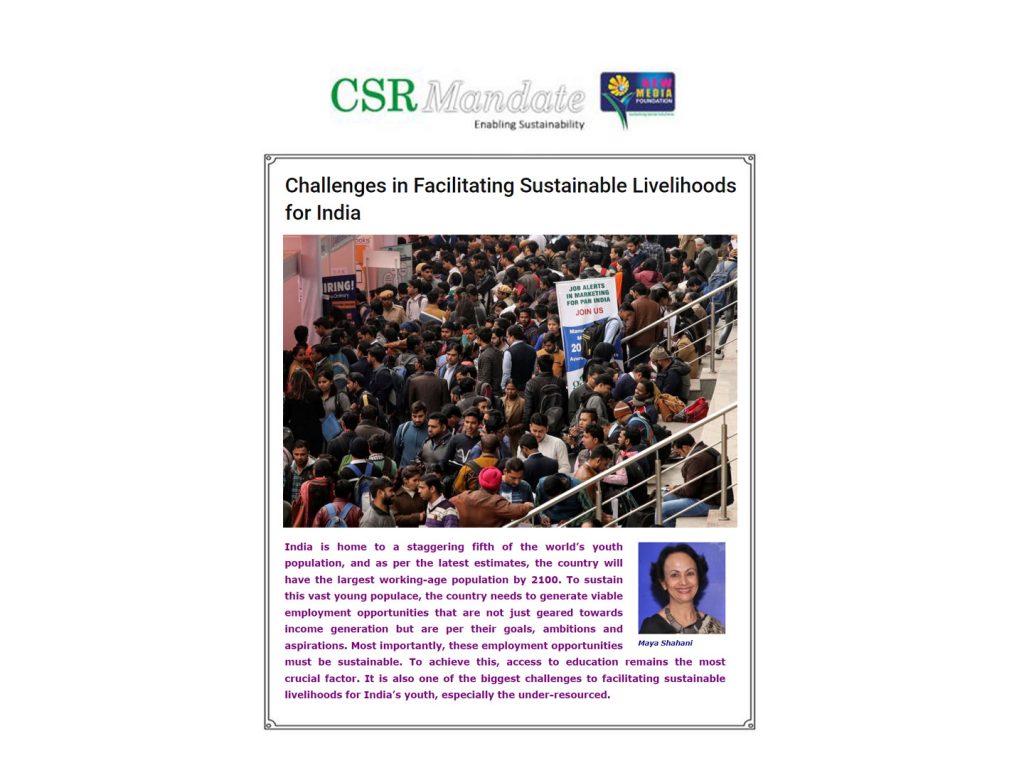Search
Challenges in Facilitating Sustainable Livelihoods for India

India is home to a staggering fifth of the world’s youth population, and as per the latest estimates, the country will have the largest working-age population by 2100. To sustain this vast young populace, the country needs to generate viable employment opportunities that are not just geared towards income generation but are per their goals, ambitions, and aspirations. Most importantly, these employment opportunities must be sustainable. To achieve this, access to education remains the most crucial factor. It is also one of the biggest challenges to facilitating sustainable livelihoods for India’s youth, especially the under-resourced.
UN Sustainable Development Goal 4 (SDG4) sets a roadmap to “ensuring inclusive and equitable quality education and promoting lifelong learning opportunities for all” by 2030. India can achieve this goal if we all work collaboratively to ensure access to high-quality education for all students. Professional courses that leverage technology and the requisite in-person support can successfully allow students, especially those with resource constraints, to access the education they need to obtain white-collar jobs that provide the security and stability blue-collar jobs often lack.
Students from smaller cities and villages often do not get the opportunity to learn effective communication in English necessary for today’s global economy. Hence, while we work toward providing them with the right professional skills and subject matter expertise, it is vital to hone their communication skills to make them effective and successful in their jobs.
Dual Approach: How Education and Intervention Can Help
We know that the biggest hurdle in facilitating sustainable livelihoods is helping under-resourced youth access the right kind of education. These barriers include geography, finance, gender, caste, and the lack of adequately trained teachers. They cause extensive hindrance in facilitating sustainable livelihoods.
We also need to adopt more contemporary and effective ways of assessment incorporating ongoing feedback and self-improvement which will help students complete their learning journey without dropping out while developing the self-confidence necessary for professional and personal success.
Students from smaller cities and villages often do not get the opportunity to learn effective communication in English necessary for today’s global economy. Hence, while we work toward providing them with the right professional skills and subject matter expertise, it is vital to hone their communication skills to make them effective and successful in their jobs.
The pandemic has exacerbated the problems leading to an increase in joblessness, jeopardising livelihoods for India’s under-resourced young people across rural and urban areas. They typically end up in blue-collar or daily wage jobs that do not offer adequate income or long-term stability. The uncertainty and unsustainable nature of such jobs were starkly highlighted during the pandemic when the manufacturing sector reported a staggering loss of 14.2 lakh jobs between March 25 and July 1, 2020.
The government has tackled these issues by focusing on skill development and entrepreneurship as viable avenues for employment generation. However, such initiatives witnessed a setback recently due to the disruptions generated by the pandemic. Without proper access to the internet or suitable devices, these youths have faced the brunt of this impact, further reducing their employability.
This is where the role of organisations can come to the forefront and help alleviate the woes of India’s under-resourced youth. They are in a position to provide robust financial support, either individually or through NGOs and non-profits, to build the necessary infrastructure and provide students with the monetary resources to afford their education. In today’s digital world, this has become even easier with the advent of online education, which reduces the need for vast physical infrastructure. Organisations can also contribute to developing modern curricula and their constant upgradation by providing industry-led inputs on the changing skill requirements.
This is precisely what SAGE Foundation, the CSR arm of The Shahani Group, is doing. Founded in 2007, it is constantly working towards providing quality education to help the under-resourced youth access well-paying and sustainable jobs. As part of our endeavour to ensure education for all, we work to connect organisational and individual donors with NGOs who work with underprivileged students. We have a solid partnership with Thadomal Shahani Centre for Management (TSCFM), where we provide direct scholarships to meritorious, under-resourced youth to obtain professional qualifications for entry-level jobs in sectors such as BFSI. We also provide placement support to help them secure employment with some of India’s top companies.
Most recently, we collaborated with TSCFM to offer the Kishore Shahani Scholarship to 200 women from low-income families impacted by COVID-19. The scholarships are helping them enrol in TSCFM’s BFSI, Digital Marketing and Business English courses.
Through our various efforts, we have trained 6000+ students and placed them in reputed companies over the last few years.
The SAGE Foundation’s work help empower these youths to rise beyond their circumstances and realise their true potential. Our partnerships make professional education accessible to them, along with constant support, training and mentorship, equipping them with the necessary industry knowledge and arming them with confidence by helping them with personality development and personal grooming. This holistic approach, in turn, prepares them for success in obtaining and retaining well-paying white-collar employment, ultimately facilitating sustainable livelihoods for more of our country’s youth.
Read Full Article: https://www.csrmandate.org/challenges-in-facilitating-sustainable-livelihoods-for-india/
